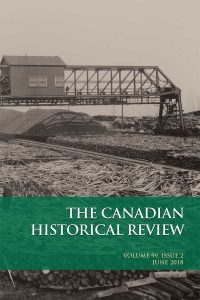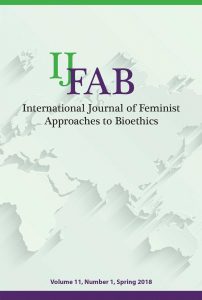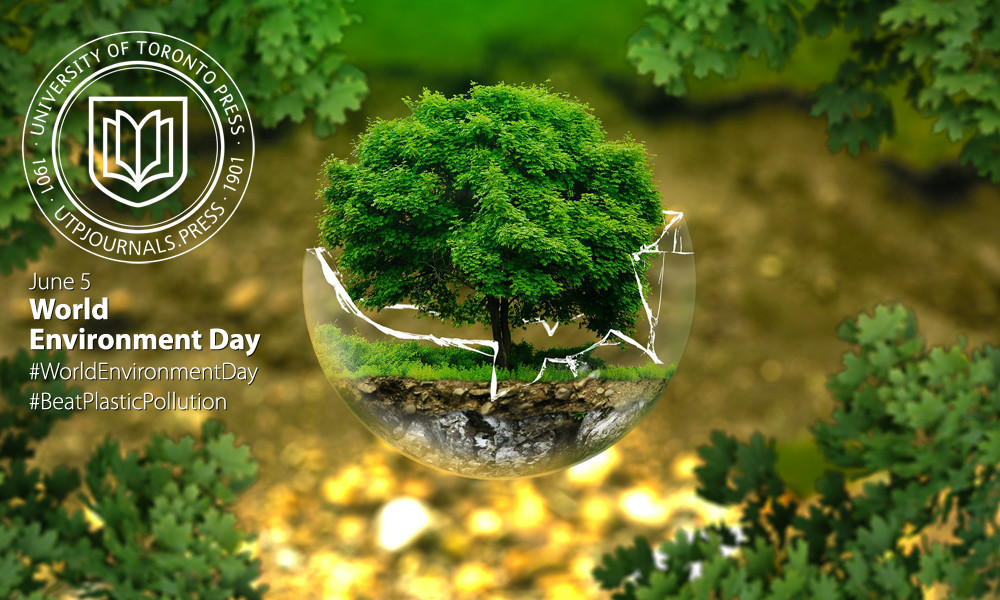Celebrated in over 100 countries since its beginning in 1974, the UN’s World Environment Day (WED) has developed into a global platform for encouraging awareness, action and, of course, learning. This year’s timely theme pledges to show the many ways that we can help beat plastic pollution.
Over the years, journals from across our collection have contributed to this important conversation, publishing articles that tackle everything from fracking to pollution, from sustainability to ecofeminism, to changes in policy. Naturally, we couldn’t resist sharing with you some of our top articles on the environment. This WED, see what our scholars are saying on the subject.
 In the latest issue from the Canadian Historical Review, Mark Kuhlberg and Scott Miller offer insight into pollution in Sudbury, Ontario. Learn how the government granted mining firms practical impunity to pollute the local environment in “‘Protection to the Sulphur-Smoke Tort-feasors’: The Tragedy of Pollution in Sudbury, Ontario, the World’s Nickel Capital, 1884–1927.” http://bit.ly/wed1chr
In the latest issue from the Canadian Historical Review, Mark Kuhlberg and Scott Miller offer insight into pollution in Sudbury, Ontario. Learn how the government granted mining firms practical impunity to pollute the local environment in “‘Protection to the Sulphur-Smoke Tort-feasors’: The Tragedy of Pollution in Sudbury, Ontario, the World’s Nickel Capital, 1884–1927.” http://bit.ly/wed1chr
How are the various ways that people think about water’s relationships to their lands and lives being confounded? Drawing on interviews with 31 concerned residents of Ohio, Anthropologica’s Anna J. Willow discusses the cultural meaning of water in “Troubling Water: Shale Energy and Waterscape Transformation in a North American Extraction Zone.” http://bit.ly/wed4anthro
 How are the longstanding systematic problems with the provision of safe drinking water on Northern Ontario’s reserves being addressed? In “Boil-Water Advisories and Federal (In)Action: The Politics of Potable Water in Pikangikum First Nation,” from the Journal of Canadian Studies, Lori Chambers suggests that the lack of care reflects colonialism, racism, and a fundamental failure of the federal government to live up to its constitutional responsibilities. http://bit.ly/wed6jcs
How are the longstanding systematic problems with the provision of safe drinking water on Northern Ontario’s reserves being addressed? In “Boil-Water Advisories and Federal (In)Action: The Politics of Potable Water in Pikangikum First Nation,” from the Journal of Canadian Studies, Lori Chambers suggests that the lack of care reflects colonialism, racism, and a fundamental failure of the federal government to live up to its constitutional responsibilities. http://bit.ly/wed6jcs
In “Meat-ing Demand: Is In Vitro Meat a Pragmatic, Problematic, or Paradoxical Solution?” the Canadian Journal of Women and the Law’s Angela Lee takes a critical, ecofeminist perspective on how, in the midst of an ecological crisis, science has been working toward making in vitro meat a commercial reality. http://bit.ly/wed2cjwl
 Kristen Abatsis McHenry takes us to the fracking sites of Pennsylvania in the International Journal of Feminist Approaches to Bioethics, and sheds light on the negative impacts of fracking on women’s health. “Fracking Women: A Feminist Critical Analysis of Hydraulic Fracturing in Pennsylvania” is part of an important discussion about advocacy, environmental politics, and gender. http://bit.ly/wed3ijfab
Kristen Abatsis McHenry takes us to the fracking sites of Pennsylvania in the International Journal of Feminist Approaches to Bioethics, and sheds light on the negative impacts of fracking on women’s health. “Fracking Women: A Feminist Critical Analysis of Hydraulic Fracturing in Pennsylvania” is part of an important discussion about advocacy, environmental politics, and gender. http://bit.ly/wed3ijfab
As oil and gas activity intensifies, so too do its environmental risks and impacts, which in turn signal a need for stronger environmental policy. So how did a five-year research project assess environmental policy trends in Canada’s four leading oil- and gas- producing provinces? Canadian Public Policy’s Angela V. Carter, Gail S. Fraser, and Anna Zalik share their findings in “Environmental Policy Convergence in Canada’s Fossil Fuel Provinces? Regulatory Streamlining, Impediments, and Drift.” http://bit.ly/wed5cpp
For more information about WED and to see how you can join the millions of people who participate each year and help make a difference, please visit: http://worldenvironmentday.global/

Comments on this entry are closed.